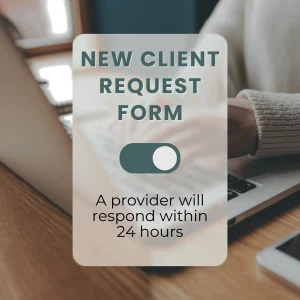
The Root Cause of Anxiety is As Unique As the Person Experiencing It
Understanding the root cause of anxiety can help you to mitigate exacerbating factors and find the right therapy for your needs. It’s important to consider all the factors that may contribute to your anxiety symptoms including psychological, physiological, and environmental factors
When Stress becomes Anxiety
Anxiety is a natural human response to stress. It’s a feeling of fear or apprehension about what’s to come. However, when these feelings become overwhelming, or persist long-term, they can significantly impact daily living, signaling the presence of an anxiety disorder.
Chronic stress, whether from work, relationships, or financial pressures, can lead to heightened anxiety levels. Recognizing the sources of stress and developing coping strategies, such as stress management techniques and time management skills, can help mitigate these effects.
Psychological Factors Contributing to Anxiety
One of the primary dimensions of anxiety is psychological factors. These include past traumatic experiences, ongoing stress, and certain personality traits. Understanding these factors is crucial in addressing the root causes of anxiety. Beyond psychological aspects, physiological factors play a critical role in anxiety. These include genetic predispositions, chemical imbalances, and the impact of other health conditions.
Personality Traits and Anxiety
Certain personality traits, such as perfectionism or low self-esteem, can predispose individuals to anxiety disorders. Developing a healthy self-image and learning to set realistic expectations can aid in reducing anxiety levels.
Genetic Predispositions
Research suggests that anxiety can run in families, indicating a genetic component to the disorder. Understanding one’s family history can provide insights into their own risk factors and inform treatment approaches. Common used are “Genesite” tests that can help determine what medications may provide optimal relief
Chemical Imbalances
Neurotransmitters, the chemicals that transmit signals in the brain, can be out of balance in individuals with anxiety disorders. Treatments such as medication can help restore this balance, alleviating symptoms.
Health Conditions and Anxiety
Certain medical conditions, including heart disease, diabetes, and thyroid problems, can trigger or worsen anxiety symptoms. A comprehensive medical evaluation can help identify any underlying health issues, forming a crucial part of the treatment plan.
Environmental & Lifestyle Factors
Environmental and lifestyle factors can also contribute to anxiety. These include exposure to stressful environments, lack of physical activity, and poor diet.
Living or working in high-stress environments can exacerbate anxiety symptoms. Creating a supportive and calm environment can help reduce stress and, by extension, anxiety.
The Role of Past Trauma
Traumatic events can leave a lasting impact on individuals, contributing to the development of anxiety disorders. Such experiences may include accidents, abuse, or the loss of a loved one. Identifying and processing these traumatic memories through therapeutic interventions can be a significant step toward recovery.
Thinking Patterns Can Fuel Your Anxiety
Although this may not be the root of the anxiety symptoms, quite often thinking patterns are the source that keeps the anxiety fueled. Anxiety is deeply influenced by our internal dialogue. The way we think, interpret, and respond to information can significantly impact our anxiety levels. Understanding how certain thinking patterns fuel anxiety is essential for anyone looking to manage their condition more effectively.
The Cause of Anxiety is as unique as The Individual
Identifying the root cause of anxiety is a multifaceted process that involves exploring psychological, physiological, and environmental factors. By understanding these underlying issues, individuals can take steps toward managing their anxiety more effectively. Remember, seeking professional help is a crucial component of this journey, offering personalized guidance and support.
FAQ's About Therapy in New Jersey
How do I get started as a new client?
New Clients can reach out to us directly via call, text or email here:
Or, you can complete a new client form and we’ll reach out to you within 24 hours here:
What are your specialties?
Our therapists have dedicated their clinical work to specific niche areas. Check out our therapy service page here to learn about our areas of expertise
What type of therapy do you offer?
We offer traditional and non-traditional therapy
Traditional therapy, such as talk therapy incudes:
- Individual therapy
- Couples Counseling
- Family Therapy
- Cognitive Behavioral Therapy
- Emotion-Focused Therapy
Do you offer Ketamine Therapy?
Yes! Ketamine has shown promise in treating various mental health conditions, including PTSD, Anxiety, Depression, Phobias and OCD. As Ketamine therapy providers, we offer this service to help clients break cycles of thinking traps that lead to compulsive behaviors.
Is Online Therapy As Effective As In-Person Therapy?
Online therapy is essentially face-to-face counseling, just conducted remotely. Studies show that teletherapy is as effective as traditional counseling. Professional organizations and state governments recognize its benefits and have set regulations for it. However, like any therapy, its success in achieving your goals isn’t guaranteed. It’s important to discuss with your therapist whether teletherapy is working for you.
What age groups do you serve?
Currently, we work with New Jersey clients ages 10+
Do you offer traditional talk therapy?
of course! though we have some unconventional therapy approaches, we are rooted in evidenced based practices. Talk therapy is a major player in the therapy room! See What we Treat and Integrative Services for more information
What Geographic Areas Are Served?
Currently, we serve clients in New Jersey and are expanding to other states as telehealth laws evolve. While telehealth offers the convenience of attending sessions from anywhere, state laws require clients to be in-state during their session.
Does my insurance cover my visits?
We provide”Courtesy Billing” for clients who are using the Out-of-network insurance benefits.
Our Insurance Page shares a small blurb about Why We Left Insurance Panels
Can I Change Therapists If I'm Not Happy?
Yes, you can switch therapists to another provider within the practice, or we can provide you a referral if preferred. We want to ensure that your time and effort are well spent, and that you are getting the relief you need, that’s why we work collaboratively with each other in the practice, as well as outside therapists who we know and trust.
What is your cancellation policy?
We ask that clients provide at least 24 hours notice in the event that they need to cancel to avoid the 50% cancellation fee. we understand that life happens and do our best to be flexible & reschedule.
How Do I Know If Therapy Is Helping?
You should feel like you’re making progress. Signs it’s working include:
Feeling comfortable talking to your therapist
Your therapist respects boundaries
You’re moving towards your goals
You feel listened to
You’re doing better in life
Your self-esteem is getting better
Is Online Therapy Easy to Use for Non-Tech-Savvy People?
Yes, it’s pretty simple to access sessions. You’ll need basic internet skills, such as opening and visiting the patient link sent to you via email. It’s similar to video chatting like Facetime or Zoom. We can also walk you through it on the phone the first time to ensure a strong connection
What Questions Should I Ask My New Therapist?
Feel free to ask anything. Some good questions are:
- How often will we meet?
- What do you specialize in?
- What experience do you have with my issue?
- What outcomes can I expect?
- How will I know I’m progressing?
- How long do you usually work with clients?
- How will we set my treatment goals?
How Should I Prepare for My First Session?
Showing up is all that you need to do! But if you really want to get the most out of session, it could help to take some time to think about what you want from therapy. It helps to write down your goals, questions you have or things that you feel are important to share.
What is the difference between associate therapists & fully licensed therapists?
Our Qualifications:
Our founder, Rebecca Sidoti, is a highly qualified, state-licensed therapist and supervisor with extensive training in anxiety related disorders and innovative treatment such as Ketamine Therapy. Mind by Design Counseling adheres to standards set by the our governing counseling boards.
To see each providers credentials, training and licenses, visit our “Meet the Therapists” Page to learn more.
- LAC/LSW are therapists who may practice clinical work under the supervision of a fully licensed therapist.
- LPC/LCSW are therapists who have completed the necessary clinical hours post-graduation under supervision and can practice clinical work independently.
Is Virtual Counseling Suitable for Everyone?
Online therapy might not be as effective for individuals with chronic suicidal thoughts, severe trauma, significant mental health history, or those recently in intensive care. Such cases often benefit more from traditional, in-person counseling. We’ll help you decide if our online services are right for you during your intake and evaluation.
What Equipment is Needed for Online Therapy?
To join a session, log in using the credentials we provide. No downloads are needed. Our platform, compatible with both individual and group sessions, requires:
A computer or mobile device with a webcam and internet access.
We’ll help you test your setup before your first appointment to ensure a reliable connection. iOS users should use the Safari browser for mobile and tablet sessions.
What Questions Will Therapists Ask Me?
It depends on your goals. Expect questions about your thoughts, feelings, relationships, work, school, and health. They’ll ask to understand your therapy goals.
How Do You Keep Client Information Secure?
Security and Confidentiality of Sessions:
Your privacy is crucial to us. We use TherapyNotes, a HIPAA-compliant platform, ensuring secure and confidential teletherapy sessions. This platform’s security features include encrypted video connections, secure data transfers, and encrypted databases, ensuring your information is safe at all times.
What is VRT used for?
we use VRT to support Exposure Therapy, a long standing traditional therapy modality to treat phobias, anxiety and stress. we send a headset directly to your home so you can access VRT from anywhere.
VRT not only helps with exposure therapy for phobias, but is great for ADHD, mindfulness, PTSD and social anxiety.












